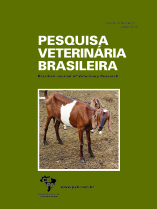 |
|
|
|
Year 2018 - Volume 38, Number 6
|

|
Dynamics of humoral immune response in pregnant mares and foals vaccinated with Theileria equi recombinant EMA-2, 38(6):1105-1109
|
ABSTRACT.- Santos A.C., Leite F.P.L., Vianna A.M., Weege G.B., Finger I.S., Müller V., Curcio B.R. & Nogueira C.E.W. 2018. Dynamics of humoral immune response in pregnant mares and foals vaccinated with Theileria equi recombinant EMA-2. [Dinâmica da resposta imune humoral em éguas gestantes e potros vacinados com EMA-2 recombinante de Theileria equi.] Pesquisa Veterinária Brasileira 38(6):1105-1109. Faculdade de Veterinária, Universidade Federal de Pelotas, Campus Capão do Leão, Cx. Postal 354, Pelotas, RS 96010-900, Brazil. E-mail: alice.cs@live.com
Theileria equi is an infectious hemoprotozoan agent of equine piroplasmosis, a disease that has severe economic and sanitary impact internationally. In addition to its common clinical features, piroplasmosis can cause gestational losses and neonatal damage, which makes neonates susceptible to this disease. The aim of this study was to evaluate the dynamics of humoral immune response to recombinant EMA-2 of T. equi in pregnant mares and foals, as well as the transfer of vaccine antibodies through the colostrum ingested by sucking foals. For vaccine production, the EMA-2 expression gene was cloned and expressed in the yeast species, Pichia pastoris. Thirty-six horses were used, of which 18 were pregnant mares and 18 were foals. The mares were divided into control and vaccinated groups, and the vaccinated group received three doses of rEMA-2 every 21 days starting at 300 days of gestation. Foals from vaccinated and control groups were evaluated until the sixth month of life. The production of antibodies by foals on the rEMA-2 vaccination schedule was also evaluated from the second month of life. Foals in the vaccinated group had received three doses of the vaccine every 21 days. The method used to evaluate serum and colostrum samples was indirect ELISA, and plates were sensitized with the rEMA-2 protein. At the end of the vaccination schedule, vaccinated mares showed a 2.3-fold increase in antibody levels when compared to baseline values. The colostrum of vaccinated mares presented antibody levels of 1.0432±0.33. Foals delivered by vaccinated mares presented levels of antibodies greater than those of foals delivered by control mares after their first time sucking (at about twelve hours after birth). Foals vaccinated in the second month of life showed an 8.3-fold increase in antibody levels when compared to baseline values. The vaccination schedule with rEMA-2 was able to stimulate humoral immunity in pregnant mares. Vaccine immunoglobins were concentrated in the colostrum of vaccinated mares and foals delivered by these mares showed an increase in serum levels of vaccine antibodies after the first-time sucking. |
| |
|
|
| |
|
 |